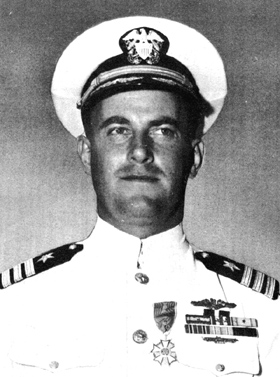USS Tang (SS 306)
 Tang,
under Commander R.H. O'Kane, set out from Pearl Harbor on 24 September 1944, to
begin her fifth war patrol. On 27 September she topped off with fuel at Midway
and left there the same day, heading for an area between the northwest coast of
Formosa, and the China Coast.
Tang,
under Commander R.H. O'Kane, set out from Pearl Harbor on 24 September 1944, to
begin her fifth war patrol. On 27 September she topped off with fuel at Midway
and left there the same day, heading for an area between the northwest coast of
Formosa, and the China Coast.
In order to reach her area, Tang had to pass through narrow waters known
to be heavily patrolled by the enemy. A large area stretching northeast from
Formosa was known to be mined by the enemy, and O'Kane was given the choice of
making the passage north of Formosa alone, or joining a coordinated attack group
(Silversides,
Trigger,
Salmon, under
Commander Coye in Silversides) which was to patrol off northeast Formosa,
and making the passage with them. Tang chose to make the passage alone
and these vessels never heard from Tang, nor did any base, after she left
Midway.
The story of Tang's sinking comes from the report of her surviving
Commanding Officer. A night surface attack was launched on 24 October 1944
against a transport which had previously been stopped in an earlier attack. The
first torpedo was fired, and when it was observed to be running true, the second
and last was loosed. It curved sharply to the left, broached, porpoised and
circled.
Emergency speed was called for and the rudder was thrown over. These measures
resulted only in the torpedo striking the stern of Tang, rather than
amidships.
The explosion was violent, and people as far forward as the control room
received broken limbs. The ship went down by the stern with the after three
compartments flooded. Of the nine officers and men on the bridge, three were
able to swim through the night until picked up eight hours later. One officer
escaped from the flooded conning tower, and was rescued with the others.
The submarine came to rest on the bottom at 180 feet, and the men in her crowded
forward as the after compartments flooded. Publications were burned, and all
assembled to the forward room to escape. The escape was delayed by a Japanese
patrol, which dropped

--116--
charges, and started an electrical fire in the forward battery. Thirteen men
escaped from the forward room, and by the time the last made his exit, the heat
from the fire was so intense that the paint on the bulkhead was scorching,
melting, and running down. Of the 13 men who escaped, only eight reached the
surface, and of these but five were able to swim until rescued.
When the nine survivors were picked up by a destroyer escort, there were victims
of Tang's previous sinkings on board, and they inflicted tortures on the
men from Tang. With great humanity, O'Kane states, "When we realized that
our clubbings and kickings were being administered by the burned, mutilated
survivors of our own handiwork, we found we could take it with less prejudice."
The nine captives were retained by the Japanese in prison camps until the end of
the war, and were treated by them in typical fashion. The loss of Tang by
her own torpedo, the last one fired on the most successful patrol ever made by a
U.S. submarine, was a stroke of singular misfortune. She is credited with having
sunk 13 vessels for 107,324 tons of enemy shipping on this patrol, and her
Commanding Officer has been awarded the Congressional Medal of Honor.
On her last patrol Tang fired twenty-four torpedoes in four attacks.
Twenty-two torpedoes found their mark in enemy ships, sinking 13 of them; one
missed, and the last torpedo, fired after a careful checkover, sank Tang.
This vessel was awarded the Presidential Unit Citation twice during her career.
Commander O'Kane has been called the Submarine Force's most outstanding officer;
he served as Executive Officer of the very successful
Wahoo before
taking command of Tang.
In her five patrols, Tang is credited with sinking 31 ships, totaling
227,800 tons and damaging two for 4,100 tons. This record is unexcelled among
American submarines. In her first patrol, spending February 1944 west of Truk
and Saipan, she sank three freighters, a large tanker and a submarine tender.
Tang's second patrol was in the area west of Palau, east of Davao and at
Truk. She made no ship contacts worthy of attack, but at the latter island she
rescued twenty-two Navy airmen during a carrier based strike at Truk on 30
April-1 May 1944. This vessel's third patrol was in the East China and Yellow
Seas. Here she sank six freighters, a tanker, and a large aircraft transport.
She covered the waters along the southern coast of Honshu in August 1944. She
sank a freighter, a large transport, a tanker and two patrol craft, while she
damaged another freighter and small craft.

--117--

|
||||||||||||||||||||
--118--